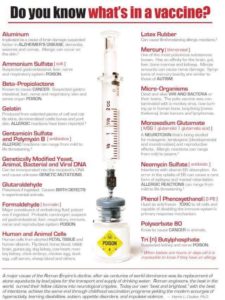
Most people, including doctors, have never read what is in a vaccine. This ignorance of the facts is what leads to death and debilitation of the vaccine recipients. DO YOUR HOMEWORK! Learning does not stop when you leave school! I read once that the common demoinator of living appears to be learning. Don’t stop living. Don’t stop learning.
Pharma School
Babes On Drugs
George Carlin On Our Times

A great quote to start the week!
George Carlin’s wife died early in 2008 and George followed her, dying in July 2008. It is ironic George Carlin – comedian of the 70’s and 80’s – could write something so very eloquent and so very appropriate. An observation by George Carlin:
The paradox of our time in history is that we have taller buildings but shorter tempers, wider Freeways, but narrower viewpoints. We spend more, but have less, we buy more, but enjoy less. We have bigger houses and smaller families, more conveniences, but less time. We have more degrees but less sense, more knowledge, but less judgment, more experts, yet more problems, more medicine, but less wellness.
We drink too much, smoke too much, spend too recklessly, laugh too little, drive too fast, get too angry, stay up too late, get up too tired, read too little, watch TV too much, and pray too seldom.
We have multiplied our possessions, but reduced our values. We talk too much, love too seldom, and hate too often.
We’ve learned how to make a living, but not a life. We’ve added years to life not life to years. We’ve been all the way to the moon and back, but have trouble crossing the street to meet a new neighbor. We conquered outer space but not inner space. We’ve done larger things, but not better things.
We’ve cleaned up the air, but polluted the soul. We’ve conquered the atom, but not our prejudice. We write more, but learn less. We plan more, but accomplish less. We’ve learned to rush, but not to wait. We build more computers to hold more information, to produce more copies than ever, but we communicate less and less.
These are the times of fast foods and slow digestion, big men and small character, steep profits and shallow relationships. These are the days of two incomes but more divorce, fancier houses, but broken homes. These are days of quick trips, disposable diapers, throwaway morality, one night stands, overweight bodies, and pills that do everything from cheer, to quiet, to kill. It is a time when there is much in the showroom window and nothing in the stockroom. A time when technology can bring this letter to you, and a time when you can choose either to share this insight, or to just hit delete.
Remember to spend some time with your loved ones, because they are not going to be around forever.
Remember, say a kind word to someone who looks up to you in awe, because that little person soon will grow up and leave your side.
Remember, to give a warm hug to the one next to you, because that is the only treasure you can give with your heart and it doesn’t cost a cent.
Remember, to say, ‘I love you’ to your partner and your loved ones, but most of all mean it. A kiss and an embrace will mend hurt when it comes from deep inside of you.
Remember to hold hands and cherish the moment for someday that person will not be there again.
Give time to love, give time to speak! And give time to share the precious thoughts in your mind.
And always remember, life is not measured by the number of breaths we take, but by those moments that take our breath away.
How Would You Like 47.5% of the Money in Your Bank to be Stolen by the Government to Prop up the Banks?
That’s what happened in Cyprus 4 years ago and has the potential of happening here unless we demand better!
Tell your MP: dictatorial powers for APRA will not prevent a banking crisis—go with Glass-Steagall now!
The Citizens Electoral Council is calling on all concerned Australians to demand their elected MPs oppose the new draft bill giving the unaccountable bank regulator APRA dictatorial “crisis management” powers. Tell your MP that instead they should act now to prevent a banking crisis by passing a Glass-Steagall separation of deposit-taking banks from financial speculation.
Glass-Steagall is the name of the successful US law that, from 1933 to 1999, strictly separated commercial banks that hold the public’s deposits, from all forms of financial speculation, including investment banking, insurance and stock broking. For the 66 years Glass-Steagall was in place there were no systemic banking crises in the USA; its repeal in 1999 led to the explosion of financial gambling that caused the 2008 global financial crisis. Australia’s major banks are financial Frankenstein’s monsters that combine commercial banking with risky investment banking, insurance, stock broking, and wealth management.
MPs must choose between the successful Glass-Steagall approach that worked, and which will prevent a banking crisis, or giving sweeping “crisis management” powers to the unaccountable agency that allowed the banks to engage in the practices that are leading to a crisis.
APRA caused the crisis
Under APRA’s “supervision”, the banks have: built up a massive housing bubble by issuing more and more mortgages—now more than 60 per cent of all of their loans—against completely unrealistic housing values; allowed property investors to recklessly increase their leverage by using the unrealised capital gains on existing investment properties as collateral for more investment loans; issued an estimated $500 billion in so-called “liar loans” to borrowers who only qualified for loans through false information; amassed a $35 trillion exposure to derivatives, the toxic financial gambling instruments that blew out the global financial system in 2008; and, while being so reckless in housing and derivatives, simultaneously ruined many thousands of individuals, small businesses and farms through mass foreclosures triggered by penalty interest rates, corrupted valuations and a general policy of starving regional Australia and productive businesses and industries of credit.
APRA, which already has enormous powers, has allowed the banks to put all Australians at risk of a devastating banking crisis, yet the Treasury plans to give APRA even more sweeping powers to “manage” such a crisis. Treasury is doing this under the direct influence of the banks, with which it has a managerial revolving door—for instance, current Treasury Secretary John Fraser moved over from the giant Swiss multinational bank UBS.
Bail-in?
Treasury is also acting in coordination with the Financial Stability Board (FSB) that is based at the Bank for International Settlements (BIS) in Basel, Switzerland, of which APRA is a de facto subsidiary. These are the organisations that, following the 2008 GFC, developed the crisis-management policy called “bail-in”, under which a failing bank is kept afloat with money seized from its creditors, usually unsuspecting “mum and dad” investors and even depositors, as in Cyprus in 2013. Thanks to an intense mobilisation by the CEC in 2013, Australia has not yet finalised a bail-in regime, but this bill gives APRA the power it will need to direct a bail-in in the future.
Also, these organisations insist on what they call “independence”, which means they do not want to be democratically accountable, and they do not want elected governments to have any say over the banking system. Current APRA chairman Wayne Byres was the secretary general of the BIS’s Basel Committee on Banking Supervision (BCBS) from 2011 to 2014, when it specified in its 2012 “Core Principles for Effective Banking Supervision”, there must be “no government or industry interference that compromises the operational independence of the supervisor”. Why? Because elected governments are extremely unlikely to implement policies like bail-in, which would cause an enormous political backlash, and in a crisis may be tempted to implement policies like Glass-Steagall that protect people but take away power from the banks. This bill gives APRA the power to manage a banking crisis, not the government.
Bankers’ power grab
The draft Financial Sector Legislation Amendment (Crisis Resolution Powers and Other Measures) Bill 2017 is 228 pages long and the Explanatory Memorandum is 174 pages long. A legal expert who examined the bill for the CEC observed that “it is no wonder that MPs have difficulty reading and understanding complex legislation and rely on their parties for explanations and directions as to voting”. It is therefore vital that constituents bombard their MPs with their concerns on this crisis management bill to force them to pay attention; otherwise, most MPs will not know what they are voting on.
The bill gives APRA dictatorial powers to totally control all Australian Authorised Deposit-taking Institutions (ADIs, i.e. banks, building societies, credit unions etc.), insurers and superannuation companies. These include the power to:
- direct the financial institution’s actions; appoint itself to take over the financial institution; and transfer assets from the financial institution, i.e. all powers that would be needed for a bail-in;
- exempt officers, employees, agents and APRA appointees from liability, i.e. no accountability; and
- prohibit public disclosure of these directives, i.e. to take over the banks in secret!
What you can do
Visit, phone or email your MP with this message:
The APRA crisis management bill gives dictatorial powers to the unaccountable agency that is responsible for the banking crisis Australia is heading into. Instead of managing the crisis, the government should pass a Glass-Steagall banking separation to prevent it—now!
Click here http://www.aph.gov.au/Senators_and_Members to search for the contact details of your MP
If you have not already sent your MP a copy of the CEC’s formal “Proposal for a Glass-Steagall separation of Australia’s banking system”, include it with your message (see links below).
(Please inform the CEC of any response you get.)
Click here to order one or more printed copies of “Proposal for a Glass-Steagall separation of Australia’s banking system” to take to your local MP or Senators. http://cecaust.com.au/main.asp?id=free_Glass-Steagall_submission.html
Click here for a PDF copy of “Proposal for a Glass-Steagall separation of Australia’s banking system”, which you can download and email to your MP as an attachment. http://cecaust.com.au/glass-steagall/CEC_Proposal_Glass-Steagall_July_2017.pdf
Click here to join the CEC as a member. https://www.cecaust.com.au/shopping/shopexd.asp
Click here to refer others to receive regular email updates from the Citizens Electoral Council of Australia.
How To Create Miracles
The Ten Indians Commandments
Australia’s high-speed rail plan is a blow to housing affordability

The writer makes a great point.
https://www.domain.com.au/news/australias-highspeed-rail-plan-is-a-blow-to-housing-affordability-20170809-gxpjzi/
Surprise twist in long-awaited phoenix crackdown
Government plans to finally crack down on illegal phoenix companies have been announced, including a surprise move to introduce “director identification numbers”.
OK article, sensational comment:
rnickey mouse 12 hours ago.
Lets recast the 3rd last paragraph, “Time after time we see failed government fall over and then see the identical disgraced politicians spring up as if the billions dollars of taxpayers money they lost never existed and pretend that they did nothing wrong. The attorney general does nothing to catch these criminals as they are all in the trough together”.
How about “We the people” demand that serving politicians be assigned a Politicians Identification Number (PIN) so we can black ban any member who is found to have squandered, wasted or lost OUR money. $3.2 billion per year – pah! That’s the interest bill on Wayne Swan/Joe Hockey/ScoMo’s debt for a day.
https://www.mybusiness.com.au/leadership/3367-surprise-twist-in-long-awaited-phoenix-crackdown





